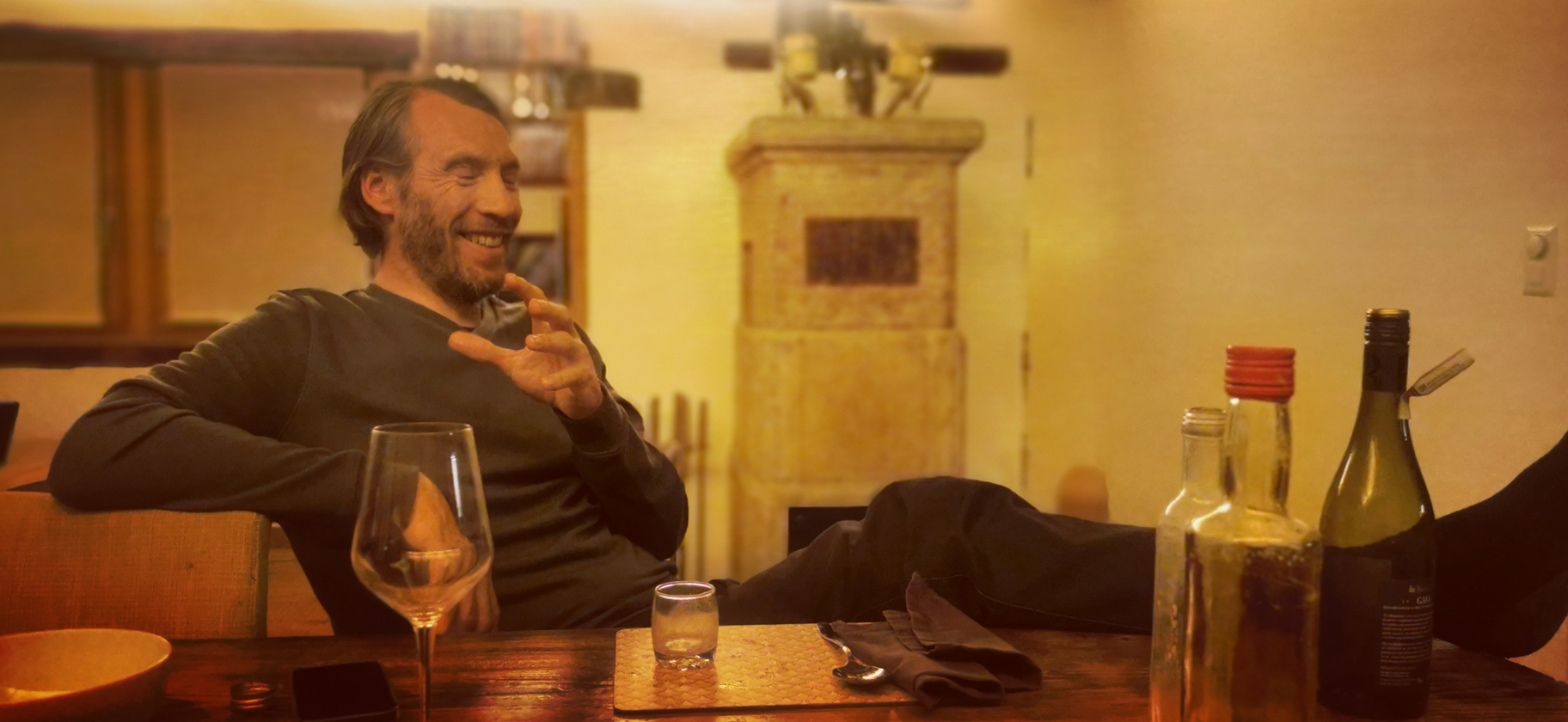Le Chalet Abitibi
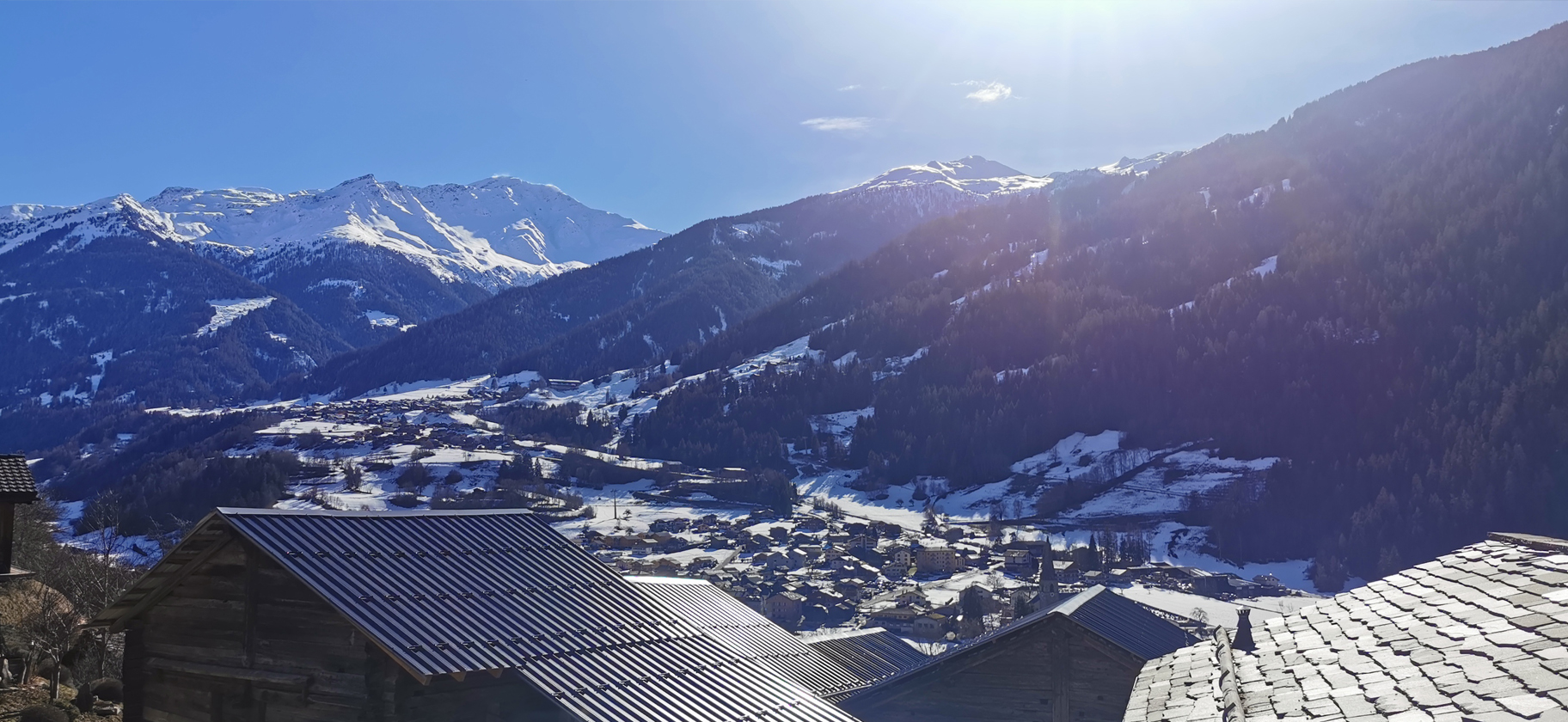
“If you can get to Martigny then I can pick you up – unless it’s a powder day in which case you’re on your own.”
This was the offer that was made to me as the European continent was closing with covid-19 cases spiking to record highs in almost every country around the world. I had managed to fly into Switzerland just three days before they instituted a new lockdown measure requiring 14 days of quarantine. Restaurants, bars, and all shops not deemed essential were closed for the foreseeable future so there was nowhere to go.
The Chalet Abitibi is located on a steep and narrow laneway that is barely wide enough for a car to pass. It sits along the slope of the mountain that runs from Verbier to the Dranse de Bagnes and is crunched in between a small commune of old wooden barns that have been renovated and converted into Alpine cabins in a sleepy little village called Le Cotterg.
I cannot recall exactly when Jay and I first met but I could only have been about 5 or 6 years old. Jay and my older brother played on the same soccer team when they were young and we grew up in the same community on the West Island of Montreal. By the time we were in our early twenties, my brother and I were attending university and living downtown, and Jay was coming in from the suburbs and sleeping nights on our couch to be up at 6 am for morning practice with the McGill University varsity soccer team. Jay and my brother played a few seasons together at McGill including winning the National Championship in 1997. Jay and I only played one season together, but we had always stayed in touch on social media and, after so many nights staying with my brother and me in Montreal, Jay was happy to return the favour and let me settle in for a small while until the covid storm passed. My brother has had a blanket ban on all social media, so if Jay ever wanted news about my brother’s life he went through me and, for as long as I can remember, he has always called me ‘Junior’.
After completing his degree in computer science, Jay went out and got a real job in Montreal. He was restless and wanted to be out on the mountain with his first love – snowboarding. Growing up in Montreal, and like most kids growing up in the 80s, Jay picked up skateboarding and used to ride his skateboard down Rock Hill – a park in the town where we grew up. In his early teens, when snowboarding was an underground sport and novice snowboarders were restricted from the ski hills, he would head down to Jay Peak, Vermont to ride the slopes needing to prove to management at the ski resort beforehand that he was capable and would not be a danger to himself or others. In his university days, he took time off and went on trips out to the West Coast and settled for a while in Ferny, BC. Shortly after he completed his degree, his younger brother, Matthew, invited him to join him in Switzerland for a season. They rented a small apartment and Jay has lived there ever since.
With a Swiss mother, making the adjustment from Canada to Switzerland was easy for Jay and his brother. For the first few years, Jay led a simple life in the Alps renting a room in Verbier from a vivacious older American woman named Roxanne and using his season pass to hit the slopes every day while working odd jobs to pay the bills. With his computer science background and technological savviness, Jay found ways to help people with their IT concerns and discovered that he could work just a few hours per week, make ends meet, and have the rest of his time freed up for snowboarding. The Swiss franc was also becoming stronger in the world economy and he could stretch it to go on ski trips to northern Norway and his latest favourite undiscovered snowboarder’s paradise – Hokkaido, Japan.
A decade passed and Jay discovered that the Swiss had lots of money to spend and those already working in IT did not have the prized North American sense of customer service that he did. In no short amount of time, he became the preferred IT service provider in Verbier and the surrounding cantons and tripled his rates. Now that he was making more money, he could afford the club membership and began to spend more time out on the golf course. He met a girl, got married, and bought an old barn that he set about converting into a home – the Chalet Abitibi.
He had a business, a marriage, club fees, and a home, but his true love was on the mountain. Responsibilities kept his attention off the lifts. There were forms and documents to finalize with builders and contractors, there were calls to make and scores of emails to respond to every day, and there was a wife who demanded the last reserves of his attention. In his heart, Jay was still a kid staring down Rock Hill on his skateboard not wanting to go home for supper because he had not yet had enough fun. He liked his toys whether it was tech gear or a new set of custom-made clubs and the work that he did during the day went toward satisfying these simple pleasures. He flirted with the idea of having a “Sunday car” to which his wife objected by suggesting that it was a gross misallocation of their monetary resources. With so many demands put on his time and energy, and diminishing ways to let off steam, he became resentful of his wife and they split up. “I feared going out to play golf because I knew she would call me and we would just argue,” he confided. Through the marriage, his ex-wife had paid in to become part-owner of the house that Jay was building. He eventually saved up enough money so that he could buy out her share and move on but there were difficult times where they were split but cohabitating.
Jay described himself as “happily divorced” and he eventually bought that “Sunday car” – a Porsche 911 which he had stored in a garage over the winter. Work was still keeping him busy seven days a week but “The Company” as he called it, was thriving and he had begun to turn the corner on covering the last 5 years of costs with the money that was steadily coming in. When it was summer he was out on the golf course every day. During the winters, when the conditions were right, he was on the mountain. It meant occasionally deferring appointments with clients but, as fellow residents of Verbier, they understood. Jay had built the foundation of his business’s success the same way that he had built his path to success on the football pitch and in life – through strong and meaningful relationships. “I was never an outstanding player,” he would say. “But I was a really good teammate.”
Ski seasons had deteriorated in Switzerland over the last twenty years because of climate change. The glacier at the top of Mont Fort had begun to recede and the yearly number of really good ski days has been cut in half. Verbier had also grown in popularity as the lesser-known and more affordable alternative to Zermatt. Even on powder days, Jay was beginning to find that some of his favourite backcountry routes already had tracks in them by the time he was able to skin up. These facts did not bother Jay all that much because he saw himself at 45 transitioning to the golf course. His snowboarding was becoming more of a leisure activity than an opportunity to push himself to his limits the way it had in his twenties. Much like his snowboarding in Switzerland, he had skinned to the top of the mountain and had a quick ride down to the bottom. By the time I arrived, he had a new perspective and was enjoying his freedom. Jay was in a comfortable place. He had just ordered a designer chair for his home office that he could charge to The Company and remarked on just how excited he was to sit in it.
During my stay at the Chalet Abitibi, I made sure to not miss the opportunity to ski in the Swiss Alps and Jay was kind enough to facilitate the experience. I had skied all of twice in my life, spread decades apart, and I warned Jay that this would be the worst ski day of his entire life because his objective would be to ensure that I made it safely down the mountain.
Thanks to his connections, I was able to rent ski equipment for free and needed only to pay for the lift ticket. There are several lifts that comprise the Verbier resort with a variety of groomed slopes and lifts reaching all the way to the summit of Mont Fort. It was these areas off the backside of the peak that were Jay’s snowboarding heaven and he would often snowboard right into Italy. We went up to the peak just for the view because the face from the peak was steep and all moguls and what Jay described as “Not-Ian-Friendly”. I took the lift back down to the main ski area and watched as Jay navigated the moguls and even he described the conditions as a rough ride. From there, the objective was to travel from piste to piste and ski our way back into Verbier town. It was ski as travel as Jay referred to it.
The Swiss Alps put Mont Avila and Saint-Sauveur, where I had cut my teeth in the snowplow position, to shame. There are runs and trails but there are no rules and every skier is entrusted with managing their own level of comfort and safety. What made things particularly challenging was it was the weekend combined with the fact that the Swiss had done nothing to curb ski tourism in response to the pandemic. I can handle a steep hill if I have a wide-open run where I can be myself and not worry about colliding with other skiers, but the slopes were packed. Jay described traffic on the mountain as light but, even having skied in Big White in BC over a Christmas season, I found it hard to find an open lane that I could take with confidence. Moreover, skiers in Verbier do not make an effort to steer clear of the person who clearly does not quite know what he is doing and instead would brush by me at top speed as though I was a flag on a slalom course. Jay was a good guide and I would try to follow his tracks. There I was stretching and straining every sinew to stay upright and Jay was leisurely gliding backwards on his snowboard while filming me on his cell phone to show my friends and family the proof that I had made it out onto the mountain.
There is a café and restaurant by one of the lifts with stunning views overlooking the Vallée where we stopped for a while to take a breather and enjoy the view. Jay made a remark that it was a crisp and cool day but there I was sitting in the snow panting and sweating from the effort. Skiing back toward Verbier I had to take one particular course with great caution and mostly on my rear end lest I should lose control and ski off the edge of the mountain and plummet to my death. I did also endure one glorious wipeout that sent my skis off into opposite directions along with my toque and mitts – ‘a yard sale’ as it is known in Canada. It kept Jay waiting for a while wondering what had happened to me, but I collected myself and carried on more embarrassed than injured.
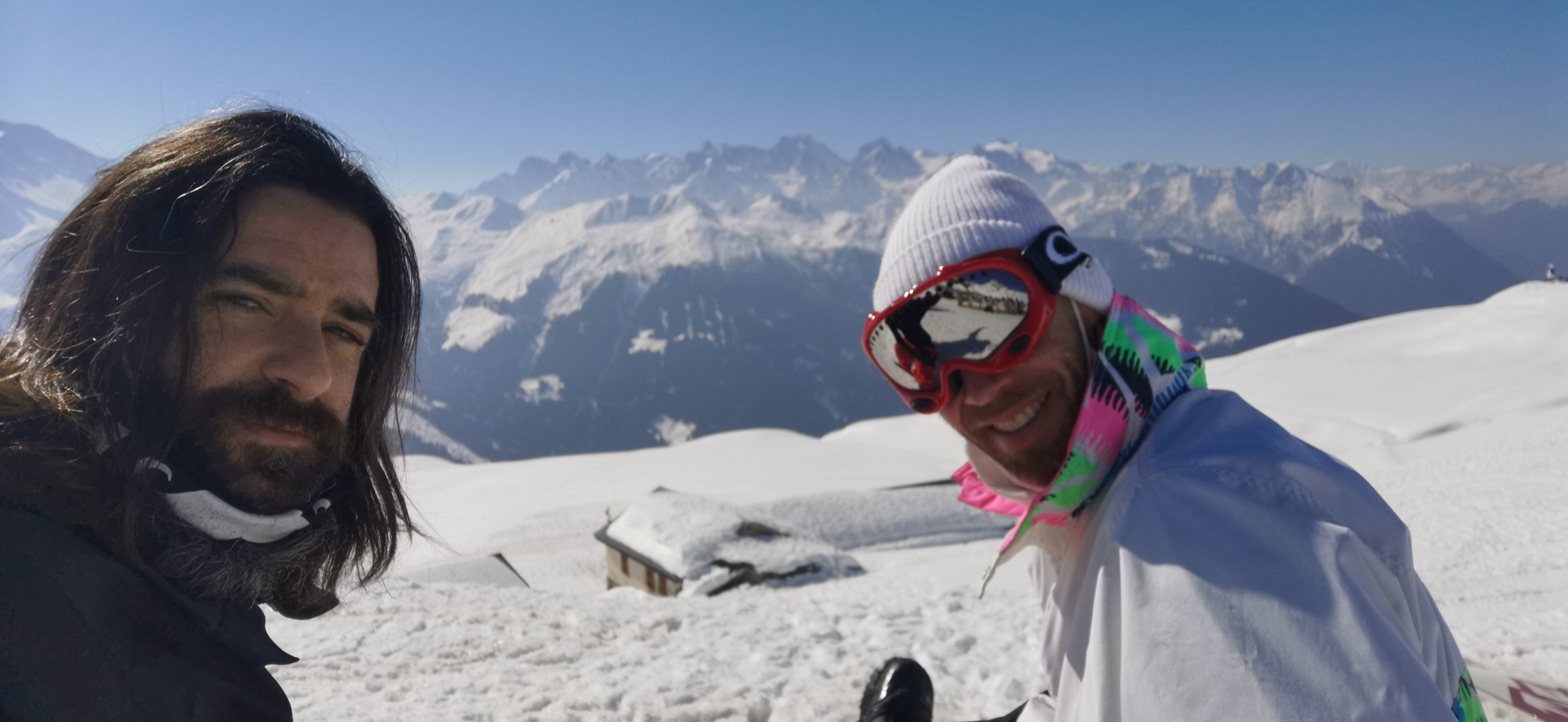
The way down consisted of several runs over several kilometres and various scenic routes through the forest to spare further injuries to my body and my pride. The whole trip could not have lasted more than three hours but, by the end, I was mentally and physically drained. What was most exhausting was not knowing what was around each corner. I recalled having skied in Québec and British Colombia previously and could remember that skiing became quite enjoyable when I knew the route. I was never afforded this opportunity in Verbier and, though I might have had a far more pleasurable experience had we returned to the top and done it all again, I was delighted to see the streets of the town and to unstrap myself from the equipment which felt so alien on my body.
Skiing in the Alps is the reason most people visit Verbier. On the other hand, I came to bide time and ease the unrelenting stress of always being on the move. On the first Saturday after I arrived, Jay and I went out to the Aligro in nearby Sion to pick up provisions. How long I would be staying was still unknown, so I reluctantly tossed a few cuts of meat onto our trolley along with a small bag of quinoa, tins of artichoke hearts, and noodles for soups. Aligro is a bulk food store that mostly serves restaurants and, with my future uncertain, it was difficult to gauge whether or not buying a kilo of butter or a two-litre tub of mayonnaise was going to be worthwhile. 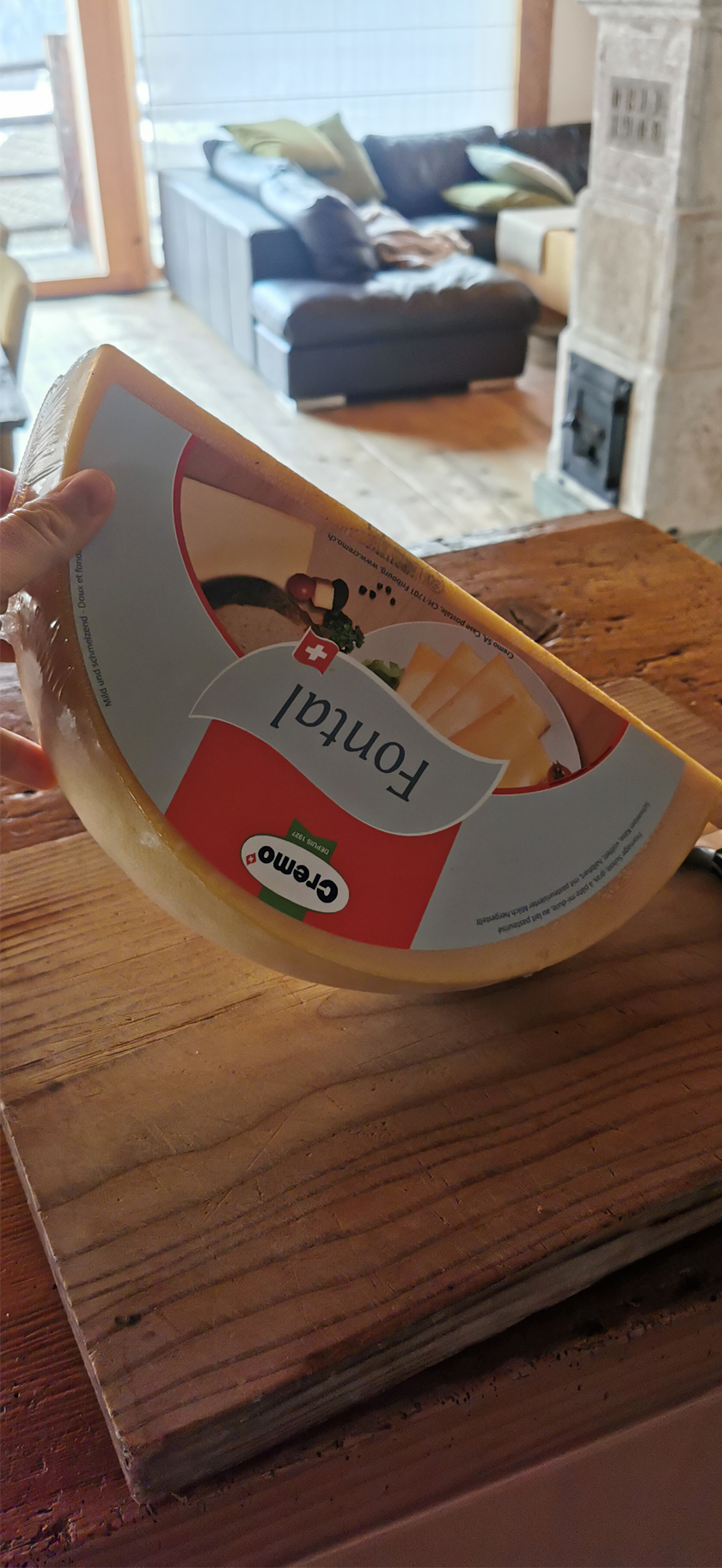 On our crate, there were 4 cases of beer, 40 bars of Lindt chocolate (mostly Lime which was Jay’s favourite), and 4 kilos of Swiss cheese. There were some other bits and bobs like my artichoke hearts and a few tins of tuna, but looking down at over 300 francs worth of allegedly edible items and it appeared absurd that two men believed they would be able to survive on what we were buying. We loaded up the refrigerator and the chocolate and beer made a wall. There was scarcely room for fresh fruits or vegetables. Whole cases of beer that would not fit we stored in Jay’s wine cellar on the bottom floor of the house. “I don’t really drink all that much beer,” Jay confessed. “Neither do I,” I told him. “Hey,” he continued, “it’s nice to look at when you open the fridge though”. Jay took a bar of lime Lindt and broke off a few squares so that I could try it. “Hmmmm,” he sighed. “What is it?” I asked. “We’ll need to pick up some more chocolate soon,” he replied with a smile. “We’re almost out”. That joke remained amusing to us for weeks.
On our crate, there were 4 cases of beer, 40 bars of Lindt chocolate (mostly Lime which was Jay’s favourite), and 4 kilos of Swiss cheese. There were some other bits and bobs like my artichoke hearts and a few tins of tuna, but looking down at over 300 francs worth of allegedly edible items and it appeared absurd that two men believed they would be able to survive on what we were buying. We loaded up the refrigerator and the chocolate and beer made a wall. There was scarcely room for fresh fruits or vegetables. Whole cases of beer that would not fit we stored in Jay’s wine cellar on the bottom floor of the house. “I don’t really drink all that much beer,” Jay confessed. “Neither do I,” I told him. “Hey,” he continued, “it’s nice to look at when you open the fridge though”. Jay took a bar of lime Lindt and broke off a few squares so that I could try it. “Hmmmm,” he sighed. “What is it?” I asked. “We’ll need to pick up some more chocolate soon,” he replied with a smile. “We’re almost out”. That joke remained amusing to us for weeks.
The night I arrived, Jay prepared a celebratory Swiss meal of raclette and potatoes served with sour gherkins and some local charcuterie. From then on the kitchen became my domain. Jay and I had an agreement that no matter how busy the day got, or how much space we felt we needed from each other, that by 7 pm we would sit and have a meal together. Six nights of the week I was responsible for the evening meal as my way to pay him back for his hospitality and one night Jay would do the cooking. It felt good to manage a kitchen again and I put a lot of effort into those meals. “I’m a bit like a Labrador,” Jay told me. “I’m not too picky, so put food in front of me and I’m going to love it.” For Jay, time spent in meal preparation meant time not spent on the mountain. He had become accustomed to preparing easy meals made from a spice packet and made in one pot like burritos, shepherd’s pie, and stir fry. With restaurants closed, I did my best to recreate meals that were Jay’s professed favourites and that he would be unable to prepare himself. My other challenge was to use ingredients from around the house that Jay had no idea how to use. “Where did the couscous come from?” I asked him one day and he had no idea. Cooking a meal with a North African twist including the couscous and stewed chickpeas with kebabs was the one time I mixed up my ratios by mistakenly doubling the water. It forced me to incorporate the entire package of couscous to make it work. I imagined we would have leftover couscous for days but Jay ate the whole thing. “You just ate close to two cups of couscous,” I reminded him fearing that he would suffer belly bloat from ingesting so much grain. “I didn’t want there to be any leftovers,” he replied. I probably could have made tuna casserole every night and he might have been satisfied but I went the extra mile making all the meals that I could from every corner of the world including ramen, tom yum, nasi goreng, paella, osso bucco, New England clam chowder, and even a night of down and dirty foods from our hometown like poutine with sauce brun and chicken nuggets.
Accompanying just about every meal was a bottle of wine. Over the years, Jay had built up quite a collection and was able to score great deals thanks to his brother who had spent a few years of his twenties working in local restaurants as a sommelier. Jay would lap up his dinner in heaping mouthfuls barely aware of what was on his plate and then softly sip his wine letting it rest in his mouth and making contact with every taste bud between his tongue and nose. He was at a loss to name a single ingredient in the meal he was eating but could then wax lyrical about the subtle notes of his wine. Some bottles were for everyday drinking like the good value table wines from Italy. Some were held back and reserved for meals where the wine deserved a dash of complexity like a French syrah. Really hard workdays usually deserved a little something extra to raise spirits like a Bordeaux or a Cab Sauv. For really special occasions, Jay had a dozen or so bottles of his favourite Barolo for which he had set away one bottle to drink every year until there were no more left.
For his 45th birthday, Jay received a bottle of 1976 colheita port wine from his brother. He was tempted to open it the day of his birthday with his brother and family set to visit over the weekend but I urged him to refrain from popping the cork until his brother could be there. “With a port that old you need to consume it the day you open it,” I told him. Sipping a 45-year-old port is a once-in-a-lifetime experience and everyone who shares it deserves to indulge while it is at the peak of its flavour. That evening, to belatedly celebrate Jay’s birthday, we prepared a tomato and cheese fondue and the port was the closer. Half an hour into a meal of cheese fondue, at the bottom of the bowl, the sugars of the cheese begin to harden into what is known as le religieuse. I do not know what is in the grass or in the hormones that they might inject the cows with that makes Swiss cheeses taste so good and melt so creamily, but le religieuse is an otherworldly taste experience. In a contest between civilization and mother nature, you would be hard-pressed to find instances where civilization held an edge over what the Earth provides but for three exceptions: port wine, Swiss cheese, and charcuterie (specifically black-hoofed Iberian ham). These are the three instances where humans inject their ingenuity and transform nature’s bounty into the triumph of civilization, and that night we spoiled ourselves with all of them. Scraping the crunchy-creamy religieuse from the bottom of the fondue bowl my eyes rolled back with delight. Outside of the Chalet Abitibi the world was crumbling and we were treating ourselves to the meal as though there was no tomorrow.
The sun continued to rise every morning and life at the Chalet Abitibi was slow and comfortable and filled with fatty, sugar-laden, delights. There were the demands of our respective workaday worlds but there was a big-screen TV with a robust sound system and nowhere to go and nothing to do during which time we watched all 11 feature-length films of the Star Wars franchise. Every night at 6 pm I would close my computer and set myself up in the kitchen to prepare the evening meal. I would flip on the television and turn on The Office to play in the background while I prepped and somehow went through all 9 seasons. Every day I would venture into nearby Le Châble to pick up a few ingredients from the JMC or Migros for the meal. 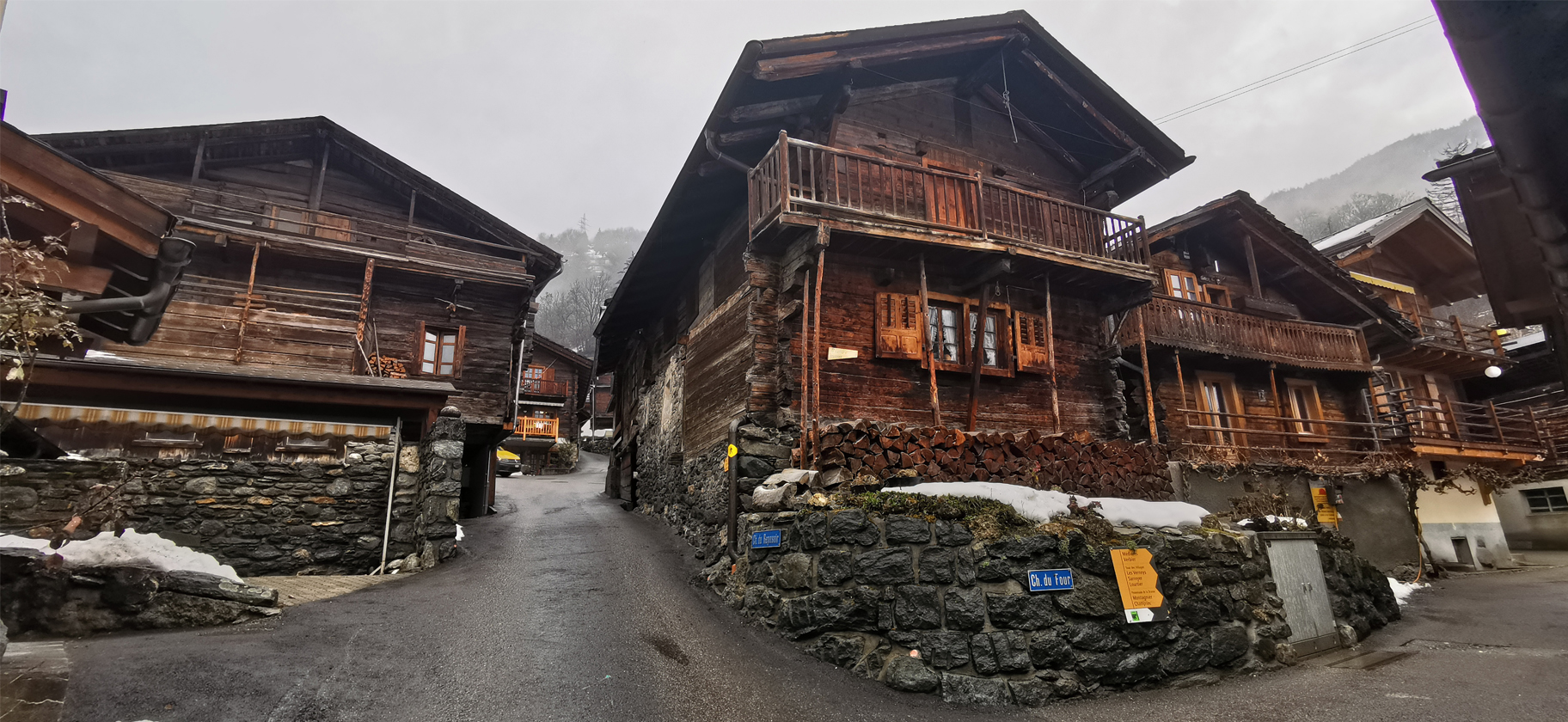 It was only a kilometre away but I called it exercise because it meant negotiating what Jay called “the Lane of Pain” – a 150-metre paved incline ascending to the chalet that made the glutes burn. Even with my daily walk to the market, my step counter got chopped at the knees.
It was only a kilometre away but I called it exercise because it meant negotiating what Jay called “the Lane of Pain” – a 150-metre paved incline ascending to the chalet that made the glutes burn. Even with my daily walk to the market, my step counter got chopped at the knees.
Besides our ski day, my only other day of real exercise was a trip I took to Zermatt to hike and catch a glimpse of the Matterhorn. Train travel in Switzerland is painfully expensive but planning a trip more than a week out meant that I could purchase a ticket to Zermatt for 55 francs instead of 110 francs if purchased the day of travel. Those 55 francs were the price simply to get to Zermatt. The Gornergrat train within Zermatt that rides to scenic points up the mountain that stare out toward the Matterhorn itself, costs 112 francs – an expense I could not justify as long as my legs worked. One train ticket and a bottle of juice cost me as much as all of the train journeys, a night stay, and a three-course meal in Poland. Pandemic aside, I found Switzerland confining simply because everything is so expensive. The Matterhorn is imposing and beautiful but Switzerland, for all of its temptations, is a paradise reserved for skiers and the wealthy. After 20 years, Switzerland had become Jay’s normal. His paradise was the mountain and he, through his years of frugality, had become entrenched in the Swiss economy which made the whole world open to him. As the days ticked away, I realized that without him, despite all of my own hard work and how far I had come in my professional life, living in Switzerland would have been out of reach.
Jay’s brother married a girl from Finland named Veera and together they had two kids, a boy and a girl, and lived a short drive away further down into the valley past Le Chable. When one of Veera’s good friends, Theresa, came to visit just before the start of the pandemic they steered her toward Jay and there had been a budding romance ever since. Over the summer when travel was still possible, Jay made a visit up to Finland and Theresa also came back to Switzerland to visit for a few weeks.
After one failed marriage, Jay was not rushing into anything but spoke with optimism and open-mindedness about Theresa expressing how easy and pleasantly placid their relationship was. She loved to golf and being able to share that activity together meant that Jay never suffered through any guilt or resentment for wanting to be out on the course. She refrained from foisting unreasonable expectations upon him and he felt able to love and be loved without having to surrender his boyhood interests for some elusive socially acceptable idea of manhood. Theresa, now with a small window opening and a negative PCR test being the only entry requirement, was planning another visit. Risking being the third wheel was the impetus I needed to get back to my old ways and to face the frustrations ahead.
The winds blowing through the valley sent mist and clouds travelling across the sky shifting through hues both hot and cold above the steadfast mountains. Though it was February, some days the temperature could rise to above twenty degrees and then swing during the night to below 10 dusting the mountains and the Vallée with new snow. There were days that stayed cool and crisp which were the most welcome as they prompted Jay to light a fire in his antique, early 20th century, stone hearth that emitted a comforting dry heat. Strong winds occasionally blew over the Mediterranean sending particulates of North African sand into the sky creating an orange haze. Outside the chalet, the whole world was unpredictable and making a decision of what to do and where to go next seemed as impossible and impassable as those mountains. With effective vaccines rolling out there was optimism that life might soon return to normal but that spirit was buoyed by variants that would spring up in places where cases were on the rise. Instead of restrictions easing, in many places, they tightened. Life and its adventures had stalled and too often it seemed easier to let the days just pass away from the office or the sofa in the passive pleasures of routine.
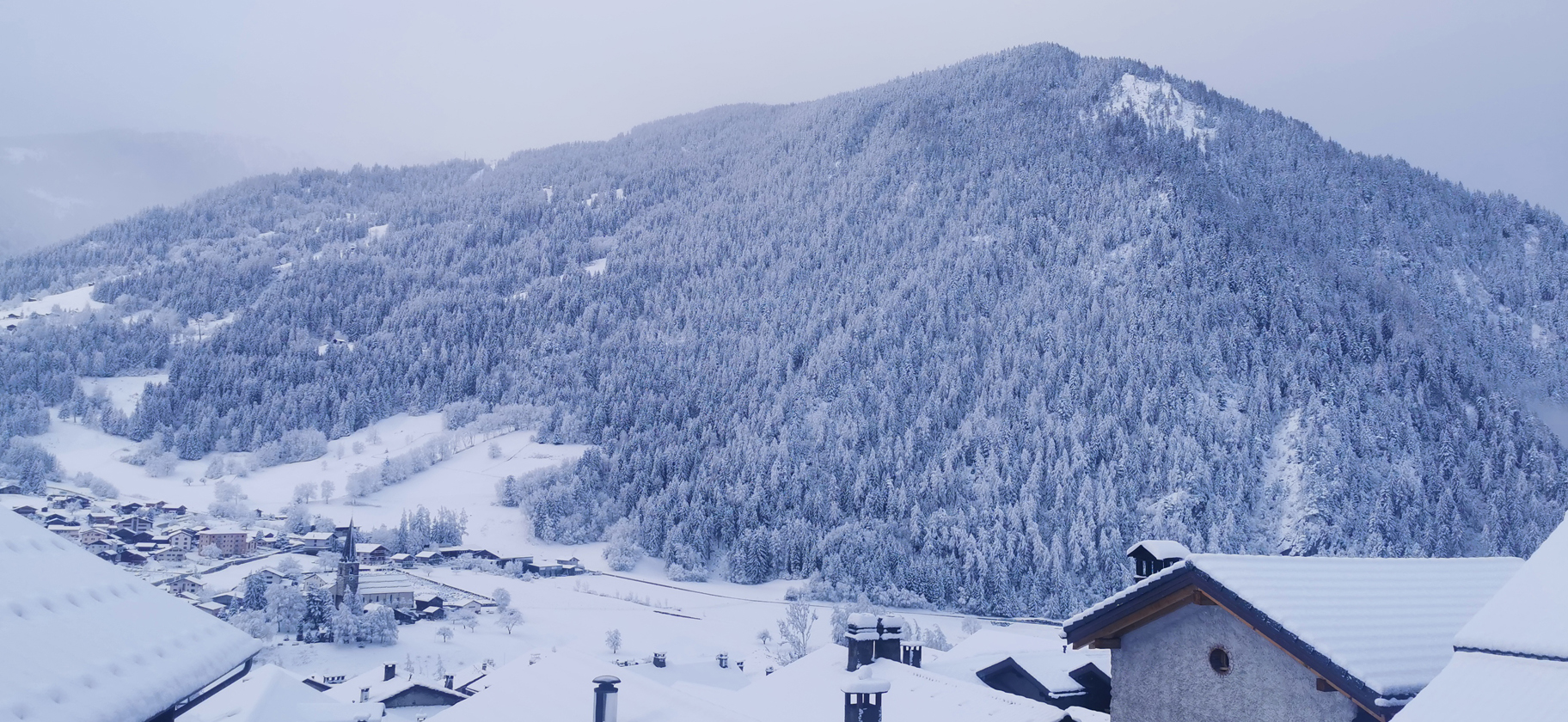
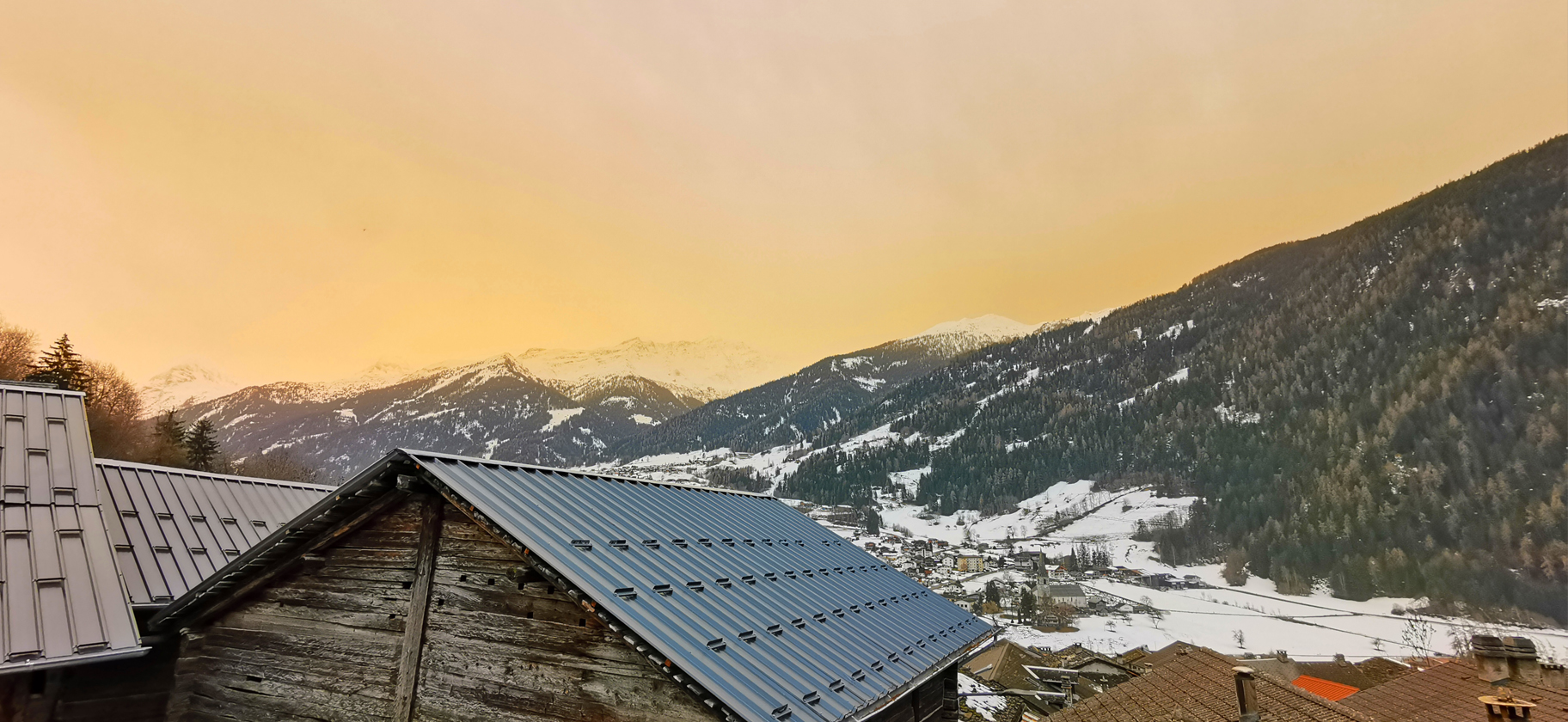
Theresa arrived and I cooked a meal of pasta and ragout and together we all sipped our wine with smiles. There was still a case of beer in the wine cellar yet to be drunk but the chocolate was all gone and I had eaten more grilled cheese sandwiches than my waistline would allow without protest. Jay and I had chatted our last chat – for at least a while.
There in that tiny hamlet of Le Cotterg sits the Chalet Abitibi – another station on the railroad of adventure and within it a happy man who has found his paradise. I could not have known when I was just a boy, a spectator at his older brother’s soccer matches, that running around on that field would be someone who would offer me a safe harbour through the most violent storm of our lifetime. Seeds of friendship can take decades to fully germinate but, within that cozy mountain home, I discovered what an interesting man Jay had become and must have always been without my realizing for so long. After 7 weeks, the day finally came when I hoisted my rucksack onto my shoulder and we said goodbye. I did not belong in Switzerland and it was time for me to return to my rightful place between places. Jay did belong in Switzerland and there would always be that barn at the top of the lane of pain with a fire going and a grilled cheese sandwich at the ready. It is with great fondness that I now get to travel with the thought of Jay staring out toward the mountain and gazing at the line of snow through the morning fog, sensing fresh powder, preparing to skin his way to the mountain top with the fascination and wonder of a teenager having found his happiness.
